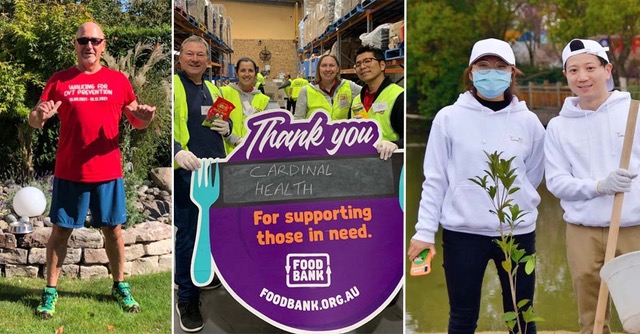Cardinal Health MarketSM
The legacy Cardinal.com Medical Ordering site has been replaced with Cardinal Health MarketSM, a new product experience designed with you in mind.

12/16/2021
Employee impact by the numbers
On January 7 this year, Cardinal Health celebrated its 50th year in business and kicked off a year of service – challenging its 44,000 employees around the globe to volunteer, collectively, 50,000 hours. Employees responded with enthusiasm from the start and have surpassed the goal.
At the time of this story’s publication, they’ve given more than 54,000 volunteer hours throughout 2021 – the equivalent of more than six years. Independent Sector, a national membership organization that provides policy leadership across the nonprofit sector, estimates that the national value of each volunteer hour is worth $28.54, based on the U.S. Bureau of Labor Statistics’ database of job functions and mean wages. That puts the value of the impact of our employees’ volunteerism at nearly 1.55 million U.S. dollars.
“Our employees have long been driven by a deep commitment to give back,” said Jessie Cannon, Vice President of Community Relations at Cardinal Health. “This year, as a way of saying ‘thank you’ to our communities for allowing us to serve them over the past 50 years, we wanted to inspire our employees to do even more. Connecting the year of service to our company’s 50th anniversary has helped us keep a steady focus on volunteerism and giving back to our communities, and to continually celebrate our employees’ generosity.”
All employees are encouraged to volunteer for the causes they care about most, Cannon explained. As a result, depending on their personal passions and skills, employees may volunteer at food banks, tutor underprivileged school children, deliver Meals on Wheels to the elderly, help out at animal shelters, or fundraise for various health issues. Many employees offer their leadership skills as members of nonprofit boards; others do pro bono work, providing free legal, financial, or marketing and communications advice and expertise.
Entire teams volunteered together this past year, Cannon said. For example, the global Legal, Regulatory, Compliance and Quality (LRCQ) team kicked off the year with a day of service in observance of Martin Luther King Jr. Day. Later, they made blankets for children and families served by Ronald McDonald House Charities and gathered books to donate to a literacy program at Nationwide Children’s Hospital. A group of attorneys from the team partnered with the Legal Aid Society of Columbus to host a virtual clinic on will preparation for low-income seniors and veterans. Team members in China planted trees on Arbor Day while those in Ireland volunteered to help promote suicide prevention education.
The Corporate Affairs team recently devoted half of a regularly scheduled meeting to an “afternoon of service,” volunteering virtually or in person. Together, they logged more than 200 hours, spreading out across our communities to pick up trash in public spaces, feed the homeless, sort groceries at foodbanks, collect donated books for school children and more.
Encouraging employee volunteerism has many payoffs, Cannon said. “Of course, the number one reason is simply helping those in need. Every volunteer hour helps.”
But volunteerism is good for volunteers, too, she said. Volunteering outside of work gives employees the chance to build skills that they may not yet be using in their jobs – skills like negotiations, communications and managing others – that help them prepare for potential promotions.
“Volunteering can also broaden perspectives by revealing how other people live and the challenges they face. And donating time to do something really different than your day-to-day work can be energizing and bring new focus. Volunteers often come back to work with new ways of thinking and creative ideas for addressing challenges.’’
There is now a growing body of research showing that volunteerism is also good for your physical and mental health. Last year, for example, a study published in the Journal of Happiness Studies revealed the results from 70,000 research participants in the United Kingdom, who were surveyed regularly over eight years about volunteerism and their health. Compared to people who didn’t volunteer, those who had volunteered regularly during the previous year reported both better health, greater life satisfaction and better mental health.
And, Doing Good is Good for You, a study published by VolunteerMatch and UnitedHealthcare, showed that 75% of U.S. adults feel better physically after volunteering; 93% report an improvement to their mood and 88% feel greater self-esteem.
“After hearing our employees share their volunteer experiences throughout the year, I’d guess that most would agree with the research,” Cannon said. “Their stories are inspiring, and their collective impact is significant.” Below, she shares a few examples.
Early in the new year, Cannon said, Cardinal Health will name is first ever “Volunteer of the Year,” recognizing the employee who donated the most hours to volunteerism.
“Cardinal Health will continue our commitment to serving the communities in which we live and work,” she said. “There are so many issues around the world – inequitable access to food, housing, education, quality healthcare – the list goes on and on,” Cannon said. “Unfortunately, nearly two years into the COVID-19 pandemic, the needs are greater than ever. However, our year of service has reminded us that every volunteer hour matters, and every volunteer makes an impact.”